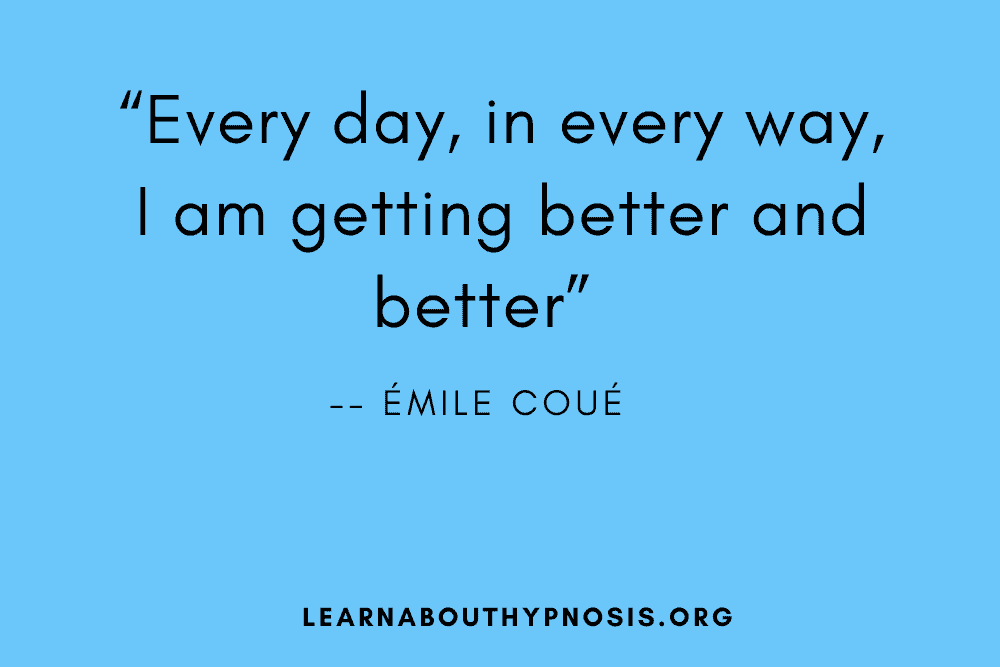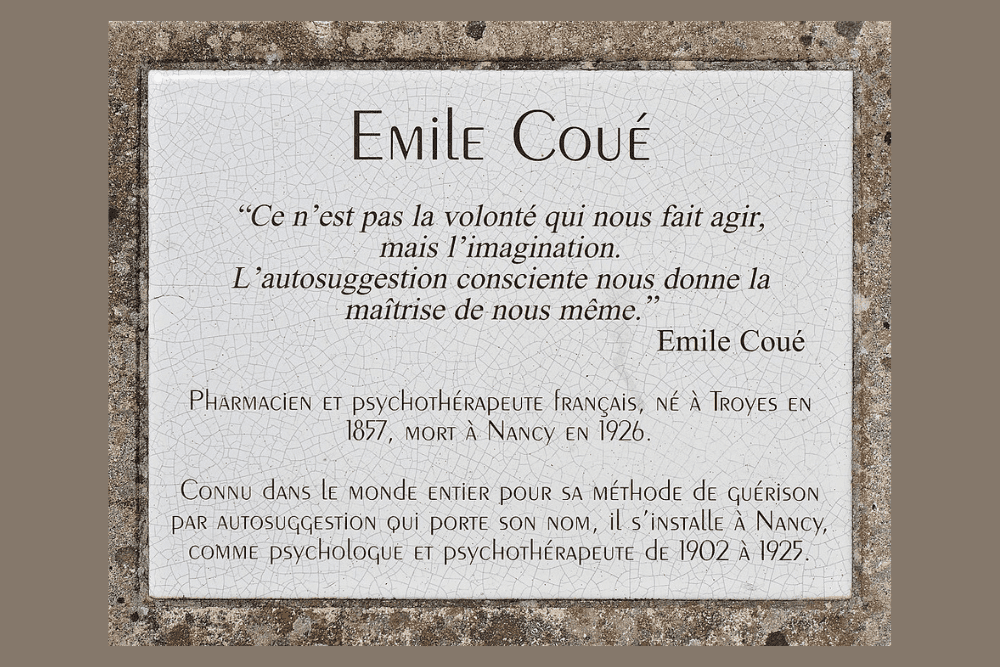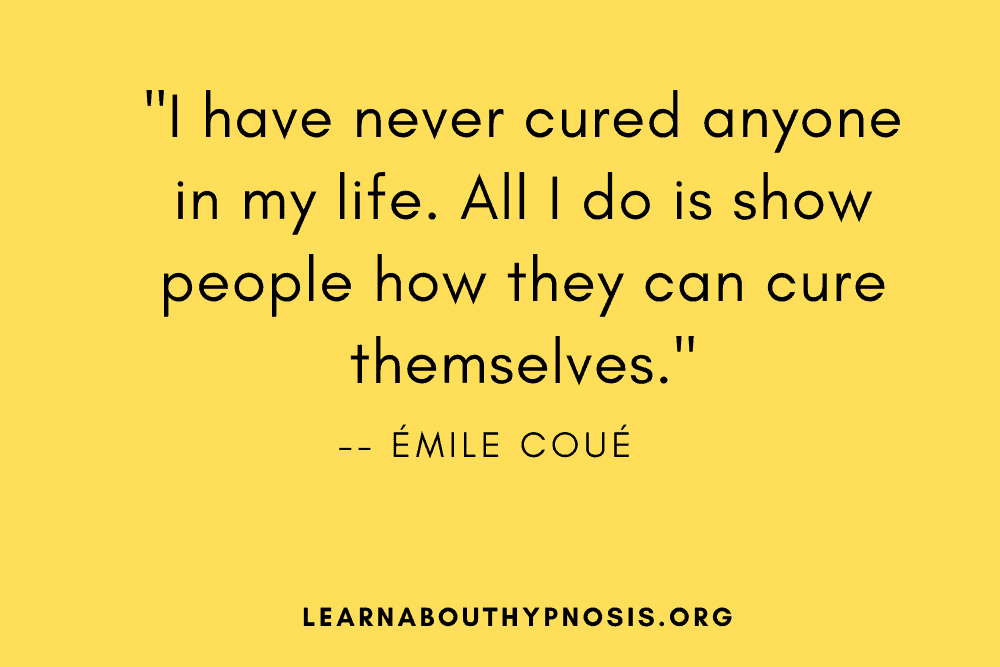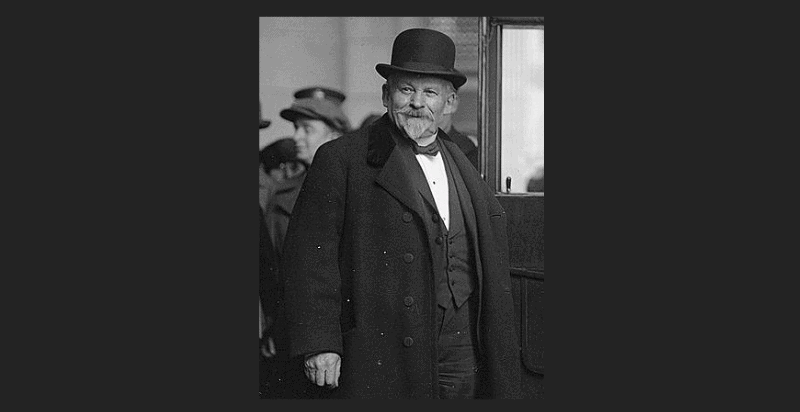Émile Coué was a French psychologist and pharmacist who introduced an innovative approach to psychotherapy and self improvement that is based on autosuggestion.
Coué was a successful businessman and pharmacist who was able to retire early at the age of 39 and transition to psychotherapy and helping others change their lives.
During his time working as an apothecary (pharmacist) he discovered what we know refer to as the “placebo effect.” He became know for reassuring his clients and praising the effectiveness of the medications he was providing them with. He even left a small positive hand written note with each medicine.
From 1886-1997, he studied in Nancy, France with Ambroise-Auguste Liebault and Hippoltye Bernheim, two of the most prominent hypnosis experts at the time.
In 1910, he sold his pharmacy business and retired to Nancy, France where he opened a clinic that treated 40,000 people per year!
In 1913, he and his founded The Lorraine Society for Applied Psychology. And his book, Self-Mastery Through Conscious Autosuggestion, was published in England in 1920 and 2 years later in 1922 in the United States.
During his lifetime, his teachings were more popular in Europe but since his death have become more popular in the United States.
Many famous self-help authors like Maxwell Malta, Norman Vincent Peale, Robert H. Schiller, W. Clement Stone and Napoleon Hill went on to become famous self-help people in the United States by spreading their own variations of Coué’s methods.
And the idea that your mindset impacts your mental health is a foundational idea to the cognitive behavioral therapy (CBT) that gained movement during the 1960’s and has shown some of the best effectiveness data for helping improve psychological outcomes, especially for depression and anxiety.
Introduction: who was Emile Coue?
Emile Coué was a French pharmacist who became a psychologist and then developed a method of self-improvement based on autosuggestion. Coue’s method became known as “The Law of Reversed Effort” and was widely used in the early 20th century.
Coué believed that by repeating a positive affirmation to oneself, one could change their behavior and improve their life. He stressed that he was not primarily a healer, but someone who taught others how to heal themselves by applying his teachings and practices for autosuggestion.

What was Coué’s Law of Suggestion?
Coué’s Law of Suggestion is a psychological principle that suggests that an individual’s subconscious mind can be influenced by suggestion. At the time, this was a new concept. Nowadays, people have heard this for over a century, and the idea that the power of suggestion could be used to improve one’s health and wellbeing traces back to Mr. Émile Coué.
Coué’s Law of Suggestion states that an individual can influence their subconscious mind through positive affirmations and autosuggestion.
Coué believed that by repeating positive statements about oneself, one could change their inner thoughts and behaviours which would then lead to improved health and wellbeing.
The Coué Method revolves round the routine repetition of this phrases as many as 20 times a day throughout the day. He taught that you should repeat the phrase in a repetitive way so that it entered your subsconsious – he firmly believed that using one’s imagination helped to change unconscious thoughts, which then would lead to lifestyle and behavioral changes.
The power of suggestion has been studied extensively in psychology and has been shown to be effective in a variety of settings. However, it is important to note that the effects of suggestion are usually limited to the specific context in which they are applied.
Psychology students will note that the concept of thoughts preceding mental, physical and behavioral changes is one of the foundational principles of cognitive behavioral therapy.
Also this phrase has become part of popular culture. In the 1976 film The Pink Panther Strikes Again, the chief inspector (portrayed by Charles Dreyfus) is directed by his psychiatrist to repeatedly use the phrase “Every day and in every way, I am getting better, and better.”
And he does this through the film, sometimes to great comedic effect, as in this scene:

How did Coué’s method work?
Coué’s method was a psychological treatment developed by French physician Emile Coue in the early 20th century. It was based on the theory that autosuggestion, or self-suggestion, could be used to help patients overcome physical and psychological problems.
Coué believed that by repeatedly suggesting to oneself that one was getting better, one could actually bring about positive changes in health and behavior. He famously said, “Every thought has a physical counterpart.”
Coué ‘s method grew in popularity throughout the 1920s and 1930s, particularly in the United States, where it was championed by New Thought movement leader Norman Vincent Peale.
In his best-selling 1952 book The Power of Positive Thinking, Peale credited Coué ‘s method with helping him overcome various health problems and achieve success in his career.
What were some of the criticisms of Coue’s method?
Emile Coué ‘s self-improvement method, which he developed in the early 1900s, was based on the power of autosuggestion. Coué developed a method that he claimed could cure just about any ailment, from headaches and indigestion to more serious diseases.
Coué believed that by repeating positive affirmations to oneself, one could change their behavior and improve their health.
While Coué ‘s method was popular for a time, it was eventually criticized for being too simplistic and for not being backed up by scientific evidence.
Some people also felt that Coué s method could be dangerous, as it could lead people to believe they could cure themselves of serious illnesses without seeking medical help.
Did Coue’s method work?
Coué ‘s method, which he called autosuggestion or self-suggestion, was based on the idea that if patients repeatedly told themselves that they were getting better, they would eventually start to believe it and get better.
Coué ‘s method became quite popular in the 1920s, with many people claiming that it had helped them overcome various health problems ranging from physical ailments like kidney problems and diabetes to a variety of mental illnesses.
However, there is little scientific evidence to support Coué ‘s claims, and some experts say that his method is nothing more than placebo effect.
Emile Coué ‘s Law
Émile Coué’s Books
Emile’s Most successful book is Self Mastery Through Conscious Autosuggestion.
Emile Coué’s Best Quotes
Here are my favorite Coue quotes:
“The power of thought, of idea, is incommensurable, is immeasurable. The world is dominated by thought.”
— Émile Coué
“It’s not the number of years that makes you old, but the idea that you are getting old.”
— Émile Coué
“Rich is he who thinks he is rich and poor is he who thinks he is poor.”
— Émile Coué
“We can make, to ourselves, very much stronger suggestions than anyone else can, whoever that person may be.”
— Émile Coué
“Patience and perseverance are necessary in autosuggestion, as well as in everything else.”
— Émile Coué
“Every thought, good or bad, becomes concrete; it materializes and becomes a reality.”
— Émile Coué

“It is the certainty that you are about to recover, that brings results, not the hope.”
— Émile Coué
“When you believe yourself to be master of your thoughts, you become so.”
— Émile Coué
“Conscious auto-suggestion, made with confidence, faith, and perseverance realizes itself automatically, in all matters within reason.”
— Émile Coué
“Always think that what you have to do is easy and it will become so.”
— Émile Coué
“If you persuade yourself that you can do a certain thing, provided this thing be possible, you will do it, however difficult it may be. If, on the contrary, you imagine that you cannot do the simplest thing in the world, it is impossible for you to do it, and molehills become for you unscalable mountains.”
— Émile Coué
“If you have the thought in your mind that you are sick, you surely will be.”
— Émile Coué
“Simplify always – do not complicate.”
— Émile Coué
“When the imagination and will power are in conflict, are antagonistic, it is always the imagination which wins, without any exception.”
— Émile Coué
“We possess within us a force of incalculable power, which if we direct it in a conscious and wise manner, gives us the mastery of ourselves and allows us not only to escape from physical and mental ills, but also to live in relative happiness.”
— Émile Coué
Emile Coue Summary
In conclusion, Émile Coué was a man ahead of his time. His techniques for self-improvement and positive thinking are just as relevant today as they were over a hundred years ago.
Coué‘s legacy is one of hope and possibility, showing us that we all have the power to change our lives for the better. If you’re looking for a way to improve your life, Coue’s methods are definitely worth trying.
If you’re feeling stuck in a rut, remember Coué‘s words: “Every day, in every way, I’m getting better and better.
Émile Coué Frequently Asked Questions (FAQs)
When was the technique of autosuggestion developed?
What is Coue’s Law?
Image Credits:
featured image: Unknown (National Photo Company), Public domain, via Wikimedia Commons
